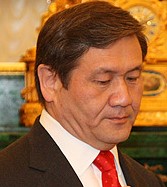Nambaryn Enkhbayar
| Nambariin Enkhbayar | |
|---|---|
| Намбарын Энхбаяр | |
 |
|
| Chairman of the Mongolian People's Revolutionary Party | |
|
In office 6 June 1997 – 22 November 2005 |
|
| Preceded by | Natsagiin Bagabandi |
| Succeeded by | Miyeegombyn Enkhbold |
| General Secretary of the Central Committee of the Mongolian People's Party | |
|
In office 5 October 1996 – 7 February 1997 |
|
| Preceded by | Büdragchaagiin Dash-Yondon |
| Succeeded by | Natsagiin Bagabandi |
| President of Mongolia | |
|
In office 24 June 2005 – 18 June 2009 |
|
| Prime Minister |
Tsakhiagiin Elbegdorj Miyeegombyn Enkhbold Sanjaagiin Bayar |
| Preceded by | Natsagiin Bagabandi |
| Succeeded by | Tsakhiagiin Elbegdorj |
| Prime Minister of Mongolia | |
|
In office 26 July 2000 – 20 August 2004 |
|
| President | Natsagiin Bagabandi |
| Preceded by | Rinchinnyamyn Amarjargal |
| Succeeded by | Tsakhiagiin Elbegdorj |
| Personal details | |
| Born |
1 June 1958 Ulaanbaatar, Mongolia |
| Political party | Mongolian People's Revolutionary Party |
| Spouse(s) | Onongiin Tsolmon |
| Children | 4 |
| Religion | Buddhism |
Nambaryn Enkhbayar (Mongolian: Намбарын Энхбаяр; born June 1, 1958) is a Mongolian politician. He served as the Prime Minister of Mongolia from 2000 to 2004, as Speaker of the Parliament from 2004 to 2005, and as President of Mongolia from 2005 to 2009. He is the first person to have held all of the top three positions in Mongolian government. He was the chairman of the Mongolian People's Revolutionary Party from 1997 to 2005.
Nambaryn Enkhbayar was born on 1 June 1958 in Ulaanbaatar, Mongolia. He finished a secondary school in 1975, and earned an undergraduate degree majoring in literature and language studies from Maxim Gorky Literature Institute in Moscow, Russia in 1980. He studied at an English language and literature course at Leeds University in the United Kingdom in 1985-1986. Enkhbayar became the chairman of the Association of Mongolian Writers in 1990. He is married to Onongiin Tsolmon in 1987 and they have four children.
In 1992, as a member of the Mongolian People's Revolutionary Party (MPRP) Enkhbayar was elected to the State Great Khural (Mongolian Parliament). Mongolia voted to retain former communist MPRP during its first venture into democratic elections, and Enkhbayar was appointed to serve as the country's Minister of Culture. He held that post until 1996, when the Democratic Party ousted the MPRP in the parliamentary elections that year. In 1996 Enkhbayar became the secretary general of the MPRP and led the opposition MPRP group in the Parliament. In 1997 he was elected as the chairman of the MPRP.
In 1999, the country was hit by one of its infamous zud spells, when summer draught and cold weather blizzards resulted in severe food shortages and loss of thousands of livestock. The government responded poorly to the disaster and the MPRP received an unexpected boost from the climatological disaster. Enkhbayar's leading MPRP won 2000 parliamentary elections winning 72 out of 76 seats. The MPRP controlling the parliament, Enkhbayar became the country's Prime Minister. He initiated an ambitious Millennium Road project to connect Mongolian territory from east to west. The road to connect Mongolia to Asian highway was never completed. On Christmas Day of December 25, 2003, Robert Friedland, owner of Ivanhoe Mines-Canada based company received a phone call from "Enkhbayar, who was asking for a spare USD50 million by the next day, to pay Mongolia’s debt to the former USSR before the New Year...As a businessman with an eye for a bargain, Robert Friedland was ready to provide the USD 50 million within the next 24 hours in exchange for an exploitation license for Oyu Tolgoi." The secret deal went through and without tender bids Enkhbayar's government gave a 100% exploitation license of Mongolia's Oyu Tolgoi-the biggest copper and gold deposit available in the world-to Ivanhoe Mines company in December 2003. The Russian Federation wrote off 97% of former USSR loans to Mongolia, which was estimated to amount to US$11.3 billion on December 31, 2003. For the three percent payment "Russians claimed they received USD200 million out of USD 250 million... There were a group of corrupt officials on both the Mongolian and Russian sides, who pocketed this money. Then Prime Minister of Russia Kasyanov, dubbed “Misha ten percent”, could not provide a credible explanation for this case, and apparently this was the very foundation from which President Putin started his investigations (in Russia.)" The two Prime Ministers Enkhbayar and Kasyanov knew where the 50 million USD which completely disappeared from the transaction. Also this was the first time since the 1920s that Mongolia did not owe debt to its northern neighbor, while it was controversial debt due to Mongolia being a raw material supplier to Soviet Union pricing the materials almost free for former USSR. Thanks to international exposure of Mongolia's vast mineral resources, the economy experienced 10% real GDP growth in 2004.
...
Wikipedia
